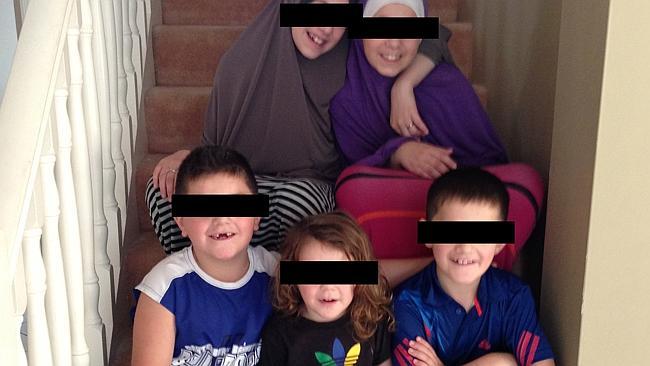Sinister borderland crossing looms for Sharrouf kids to ISIS
If Karen Nettleton is able to rescue six children and escape from Syria, she will likely have survived a sinister neverland.

If Sydney grandmother Karen Nettleton is able to sneak into Syria to rescue six children and escape back to Turkey, she will likely have spent up to $1 million and survived a sinister no-man’s land dominated by Islamic State terrorists and ruthless smugglers.
Here on the Turkish-Syrian extremes lies the desolate border village of Akinci, where the children of Australian terrorist Khaled Sharrouf, Nettleton’s orphaned grandchildren, are most likely to flee if they survive this improbable mission. It is a flat plain, stark and sterile, accessed by a single, potholed, dusty track.
Just 20 minutes’ drive from the shut border gates at Oncupinar, it’s an eerie territory where Islamic State fighters cross into Europe and dealers, fixers and smugglers, their hands greased with enormous amounts of money, act as the gatekeepers — or, more accurately, the tunnel minders.
It has a stagnant air of death during the day. But by night it’s a porous point in the 822km Turkey-Syria border that has seen a semi-regular flow of arms, men, families and cash crossing between the two countries.
This is the terrorist hotspot where Brussels bomber Ibrahim El Bakraoui was caught facilitating the movement of jihadists between Turkey and Syria and sent back to Europe, only for Turkey’s warnings to be ignored. It’s the route Paris attack mastermind Abdelhamid Abaaoud is believed to have used to enter Syria, and other Belgian cell members followed suit.
Just north of the village, in a Gaziantep hotel room, I overheard a “fixer’’, juggling two phones and alternating between Arabic and heavily accented English, talking with two others in the room through the night about the border and reassuring one of the men about “getting paid when the job is done, not before, but after’’.
It was a muffled conversation but something — or someone — was being smuggled. An alarm went off at 2.20am, just before the darkest part of the night.
Hours later on the border, the Turkish military arrested 10 Islamic State fighters, one of whom was wearing a suicide vest. Another three escaped during a firefight.
Ms Nettleton and the eldest of the six children, Zaynab, 15 — who gave birth to a daughter four months ago believed to have been fathered by Sharrouf’s brother-in-arms Mohamed Elomar, now dead — will have to engage a series of such connected and armed men to move from their base in Raqqa.
They would then head north through Islamic State-controlled land until they arrive at a Syrian town called Havar, directly adjacent to Akinci. Once across, they would rest in Gaziantep before flying on to Istanbul.
“It’s a deadly mission,’’ said Martin Wagge, the head of ABP Group, a firm specialising in recovering kidnapped children. He said that was particularly the case if Ms Nettleton went inside Syria to find Zaynab, Hoda, 13, Abdullah, 11, Zarqawi, 10, Humzeh, 5, and Zaynab’s baby, Ayesha.
The children have been in Syria for more than two years but any advantage in knowing Raqqa will dissipate quickly once they move towards the border.
The boys appeared to have received weapons and military training, judging by social media photos of them with Yazidi child soldiers, and the gruesome photo of Abdullah holding a severed head that was posted by Sharrouf, his Sydney-raised father.
But Mr Wagge said it was a nonsense that the children would be protected because their father was a prominent Islamic State soldier. “That would give them no protection whatsoever,’’ he said.
Mr Wagge said several European parents had contacted him to extract their children from Syria but the price put on their freedom by Islamic State was so excessive, at more than $350,000 each, that families couldn’t afford to pay.
Even poor Yazidi families, negotiating directly with the extremists and with extensive knowledge of the perilous situation on the ground, have been paying more than $30,000 for their kidnapped child soldiers to be released.
Mr Wagge said he could understand Ms Nettleton’s concern for her grandchildren, for he believed the girls were at risk of being sold as sex slaves to Islamic State soldiers and the boys drafted and trained as child soldiers and potential suicide bombers, but he said an operation to extract them would be very high-risk, costly and, with six children, the risks multiplied.
The children’s father is claimed to have been killed in an airstrike last year. Their mother, Tara Nettleton, is thought to have died from medical complications late last year. Elomar, who married Zaynab when she was just 13, was killed in a drone strike last June.
Karen Nettleton is believed to have travelled to Turkey with her lawyer in an effort to bring her grandchildren out of Syria. She had gone to Malaysia with Tara and the children in February 2014, having planned to take a “holiday”. Tara and the children then continued on to Turkey and Syria.
Now, without help, there is no way for the children to come back.
Ibrahim, an elder from Aleppo, has been in Turkey for four months but, standing on the border fence, he revealed to The Australian he was planning that night to return to Syria with several other families, including a household of eight with three toddlers.
The only way in, he said, was near Akinci, through a tunnel underneath the huge 2½m-wide concrete blocks and deep moats installed by the Turkish government. He was heading back in using the very route the Sharroufs will most likely take to get out.
Ibrahim was blunt in his assessment of the Sharrouf children’s future: “They will be killed or they will be sold.’’ He claimed that if they were in the Syrian town of Azaz, just over the Turkish border on the road to Aleppo, he would be able to help get them out. “But Raqqa no, they will need the help of a lot of people and it is too easy for someone on the way to take the money and then to slit their throats. I have seen it — someone cries and they slit their throat.’’
Yet many families gathering here are now readying to sneak into Syria. The rate just for the illicit crossing to Syria is about $US300-$US500 ($400-$665) each. To get out is higher.
Billions in EU refugee aid money is now flowing to Ankara on the condition Turkey stops the migrant flow across the Aegean Sea and on through the Balkans: this is the frontline of that suppression. The migrants who fled the Russian bombing of Aleppo and Azaz have found themselves stuck on the Syrian side of the border for more than a month.
Those who previously crossed into Turkey are now hosted in refugee camps in Kilis, or in nearby private homes in Gaziantep, but for the past week have been prevented from leaving this particular region. The Turkish government is trying to confine the migrants to the southeast border area and limit their access to people-smugglers in the bigger cities.
‘’No Ankara, no Istanbul, nothing here for us, nothing to do, no future, we go back to Syria,’’ said the head of the family of eight.
He has tried without success to get through the Oncupinar official crossing, like the long queue of families with their possessions bundled into a few bags each, and so he is preparing to take the tunnel route. In recent days Turkey has tightened security in this region, particularly as Mehmet Ozturkin, the most recent suicide bomber in Istanbul, who killed four, hailed from Gaziantep and was a member of Islamic State.
Between Gaziantep and the border this week there were two police and military checks. On the return journey undertaken by The Australian there was a permanent military check with sniper lookout. There appear to be more than cursory checks of Turkey’s regular truckloads of supplies to nine large camps on the Syrian side, where more than 40,000 Syrians are seeking refuge. Local transport drivers told the Middle East publication Al Monitor that the nightly people-smuggling of 3000-4000 people each way between the two countries of six months ago had slowed down to about 300-400 each night now, but that soldiers were still being paid to turn a blind eye to certain activities.
“Crossings have declined, but not ended,’’ Al Monitor reported. “They take place mainly in the evenings, particularly from the villages of Arpakesmez, Akinci and Inanli. I can’t give you an exact figure but we have daily traffic of 200 to 400 people.”
Ms Nettleton has not yet been among those numbers, as she is believed to be still in Istanbul, and it is more likely her minders will convince her to remain on the Turkish side of the tunnel somewhere near here. The big questions are whether she and Zaynab have located trustworthy contacts inside Syria to get the children to the border crossing, and how she has funded the operation.
“They will need to work very discreetly and find the right people who are willing and have the access and can walk freely in Raqqa,’’ Mr Wagge said.
“To get people out of a war zone is not easy, especially when you don’t have friendlies in there. If they had coalition forces inside Syria it would be so much easier, but they aren’t there. Without the proper contacts and skills, it is a suicide mission.’’



